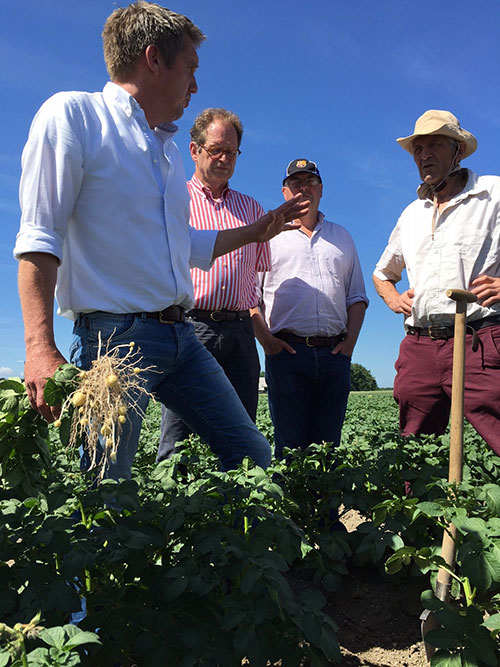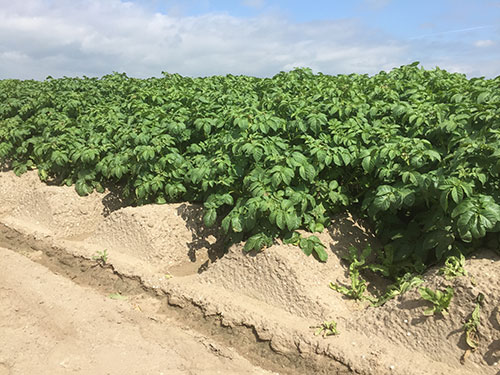Some farmers' views on potato markets
The coronavirus crisis has thrown local and international potato markets into turmoil – we have asked some members of the European Arable Farmers' Club about their experiences over the past few weeks.
'Dutch potato market has collapsed' – this headline distressed Leo de Jonge at the end of March. He grows potatoes and onions in the Flevopolder at Zeewolde, the Netherlands. Major losses were suffered, especially with the varieties used for French fries, due to the downturn in demand from restaurants and canteens. Contracts were served by the factories, but free potatoes remained standing in the warehouse. There is only demand for animal feed or digesters. "We have been promised compensation if we use our potatoes for this, but that will only cover a third of our losses. Prices fell from €160/t to €20/t", says Leo de Jonge.
"The Dutch government takes better care of their farmers", is Christophe Vandamme's comment. He grows potatoes for French fries and crisps at Fleurus, south-east of Brussels. "For us, the situation has two different sides", he says. Crisps are not suffering very much from the crisis. "Although the Olympic games and football matches have been cancelled, people are still eating crisps at home on the sofa." But his experience with French fries is similar to Leo de Jonges'. "The factories are attempting to take all of the contracted quantities. They are trying to be fair to their suppliers and are not rejecting more batches than at other times." The factories increased their production of flakes to 100% of their capacity. Normally they only process the waste from French fry production, but now they are also using the whole potatoes. The requirements for storing flakes are lower than for storing French fries. The free potatoes will remain in the warehouse, and Christophe will determine whether there is any demand for them in July or August. Otherwise, they will be fed to the digester or ploughed back into the fields. Prices for contracted potatoes are fixed or semi-fixed in a range with lower and upper limits.
Christophe also rents some land to grow potatoes in the Bordeaux region in France. Here, he was lucky because the bad weather in spring delayed planting until mid-March. The crisis had only just started then and the factory advised him not to plant the French fry varieties. So he only planted the crisp varieties and the landlords accepted his cancellation of the rest of the land. "Cultivating good and fair relations between partners pays off in critical situations like these."
"People are cooking and eating at home much more than before the crisis", comments Eric Plasmans (Villeron, France) on the reasons for the changes on the market. The farmer grows, stores and delivers fresh potatoes directly to supermarkets in Paris. "Sometimes demand has been higher than our daily production capacity".
Sales increased by 33% in March and April compared to the same period in 2019. During this period, consumption of basic products such as pasta, flour and potatoes was high. Some stores were unable to keep up with demand for pasta or flour. The situation for potatoes was different due to our geographic proximity to supermarkets in the Paris area; some trucks were required to deliver twice a day. The potato campaign for the fresh market will end without stock carry-over to the new campaign; it's a good thing for the market when there is no carry-over. The market remains between €200-250/t for basic potatoes and €300-350/t for boiled potatoes.
Specialised in seed potatoes, Wilhelm Bommers (Sombreffe, Belgium) has hardly been affected by market turbulence this year. In his business, almost 100% of the harvest are contracted, and a huge amount is exported to the Mahgreb region. The export season starts in October and is virtually over by the end of January. All contracts have been fulfilled. "The price level is also OK", says Wilhelm Bommers, "even if we don't know the final prices yet". As he sells via a sales agent, the prices will be finalised in June.
The only service that has decreased this year by 10 – 15% is cutting seed potatoes for other farmers. Looking at the new crop that is growing, Wilhelm Bommers is wondering about further developments: which varieties will be in demand next season, at what prices and in which regions? But this is entirely unpredictable. So, as always, the future is risky, especially in the potato business.
The European Arable Farmers' goal is to cultivate the European idea through the exchange of experience and information amongst crop producers in European countries. If you are interested in joining this group, please contact Alexander von Chappuis, DLG e.V., tel. +49 69 24788 313 or by e-mail at: a.chappuis@dlg.org


